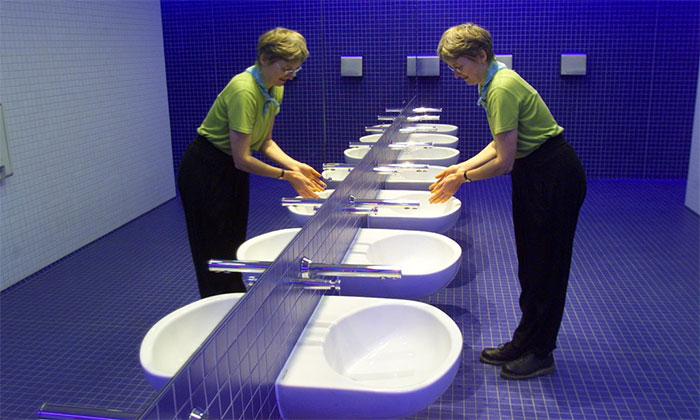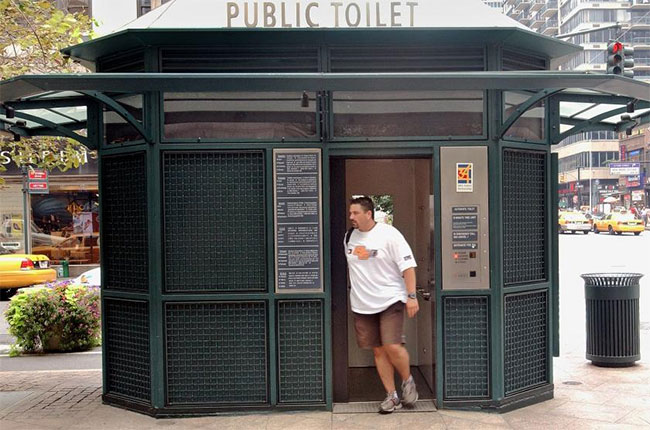Covid-19 made scientists think again about public toilets
According to experts, sensor spouts and hand-free openers are useful inventions that improve the safety of public toilets.
According to The Guardian, scientists and architects believe that the Covid-19 pandemic directly exposed the gaps in the design of public toilets. These fundamental errors are likely to be the major cause leading to the second coronavirus, even a completely new pandemic.
Covid-19 paved the way for the enactment of future rules of design and design innovation to control disease. In addition, there are larger investments from epidemiologists in construction projects, which consider the design process to be used only for "cropping."

Scientists and architects believe that the Covid-19 pandemic directly exposed gaps in the design of public toilets. (Photo: The Guardian).
Some improvements are also recommended by experts such as sensor faucet, self-cleaning toilets and doors that do not need to touch the handle.
Advocates of the idea said they would improve the level of hygiene by minimizing contact with the surface that is the main source of infection. Through this, they hope to help people have confidence in public sanitation services, even recover the economy after the epidemic with net profit.
The World Health Organization (WHO) has acknowledged the shortcomings in the design of public toilets, and has recommended the use of paper towels to turn off the hand washing faucet safely.
Peter Collignon, professor of infectious and microbiology at the Australian National University, says the surface of the wash hose and the doorknob are the sources of infection in public toilets.
'We need to have toilets open and close easily, preferably without touching the doorknob. Sensor washing spouts should also be considered, ' Collignon said.

Doors in public toilets should be rechecked to minimize the risk of touching the surface, especially if the user does not wash their hands properly. (Photo: Citymetric).
Collignon also recommends that people use personal hand washing water instead of hand washing in public toilets.
Ian Mackay, associate professor of virology at the University of Queensland, said that the doors of public toilets should be re-checked to minimize the risk of touching the surface, especially if users do not wash their hands properly.
He said the two areas of health and architecture need to work more closely on the design of public toilets. 'There are viruses spread from the waste in the restrooms we use , ' he said.
Sarah Bookman mentioned the political and cultural impact of public toilets in her thesis at the University of Auckland. "There are inherent design problems with the sanitation of these facilities that cannot be ignored anymore ," she said.
She also said that self-cleaning toilets with the ability to clean toilets when closed can be installed in large quantities by the government.

Through the Covid-19 pandemic, sensor exhaust will become more important. (Photo: Citymetric).
'This is a great cleaning tool. You can really feel the cleaning process. I think they are really design features in the future, while the current sanitation system is no longer suitable, ' Sarah said.
For the time being, we still use a paper towel to turn off the washing faucet. But in the future, more modern solutions will be born. For example, through the Covid-19 pandemic, sensor exhaust will become more important.
According to Sarah, who has been in charge of designing public toilets at the well-known architect firm New Zealand Studio Pacific, making sure to improve the sanitation of public toilets can be of great help. in the economic recovery after the pandemic.
- Surprise facts about public toilets
- Why are some people unable to defecate in public toilets?
- How to use public toilets safely, avoiding Covid-19 infection
- Toilet public also know face recognition in China
- Special toilets in China
- Tips to avoid spreading diseases from public toilets
- The 11 most unique public toilets in the world
- The reason for ice cold to male toilet toilet is not known
- Don't put up paper when you go to the public restroom, it's useless too
- Why does modern Japan still exist squatting?
- The idea of a pop-up public toilet in the Netherlands
- The largest collective pit of the planet
- The panoramic view of the toilet bowl is on every grain
- Unexpected truth about public toilets
 Chinese doctors have created medical masks that cover only the nose for convenience of eating and drinking
Chinese doctors have created medical masks that cover only the nose for convenience of eating and drinking Scientists have found a way to help you regrow new teeth after only 2 months
Scientists have found a way to help you regrow new teeth after only 2 months Do non-stick pans cause cancer? What alternatives are there?
Do non-stick pans cause cancer? What alternatives are there? Blisters around the body: Causes, symptoms and treatment
Blisters around the body: Causes, symptoms and treatment